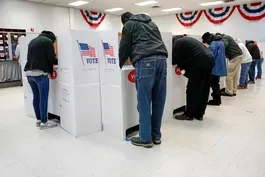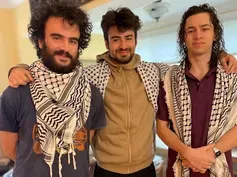
What's next in Israel-Hamas conflict after cease-fire ends
Clip: 11/29/2023 | 7m 35sVideo has Closed Captions
Former State Dept. official on what's next in Israel-Hamas conflict
Mediators in the Israel-Hamas war are working to win another extension of a six-day-old pause in fighting. Israel says it's willing to continue the pause if Hamas keeps releasing hostages. Hamas also claimed the youngest hostage was killed in an Israeli bombing before the ceasefire. The Israeli military said it's investigating the claim. Geoff Bennett discussed the latest with Aaron David Miller.
Problems with Closed Captions? Closed Captioning Feedback
Problems with Closed Captions? Closed Captioning Feedback
Major corporate funding for the PBS News Hour is provided by BDO, BNSF, Consumer Cellular, American Cruise Lines, and Raymond James. Funding for the PBS NewsHour Weekend is provided by...

What's next in Israel-Hamas conflict after cease-fire ends
Clip: 11/29/2023 | 7m 35sVideo has Closed Captions
Mediators in the Israel-Hamas war are working to win another extension of a six-day-old pause in fighting. Israel says it's willing to continue the pause if Hamas keeps releasing hostages. Hamas also claimed the youngest hostage was killed in an Israeli bombing before the ceasefire. The Israeli military said it's investigating the claim. Geoff Bennett discussed the latest with Aaron David Miller.
Problems with Closed Captions? Closed Captioning Feedback
How to Watch PBS News Hour
PBS News Hour is available to stream on pbs.org and the free PBS App, available on iPhone, Apple TV, Android TV, Android smartphones, Amazon Fire TV, Amazon Fire Tablet, Roku, Samsung Smart TV, and Vizio.
Providing Support for PBS.org
Learn Moreabout PBS online sponsorshipAMNA NAWAZ: Welcome to the "NewsHour."
Tonight, mediators in the Israel-Hamas war are working to win another extension of a six-day-old pause in fighting.
The current temporary cease-fire ends early tomorrow.
GEOFF BENNETT: Israel says it's willing to continue the cease-fire if Hamas keeps releasing hostages.
But Prime Minister Benjamin Netanyahu also reaffirmed today his commitment to continue the war and seek the destruction of the terrorist group.
BENJAMIN NETANYAHU, Israeli Prime Minister (through translator): In the last few days, I have heard the question if, after this phase of returning our abductees is exhausted, will Israel return to fighting?
So, my answer is an unequivocally yes.
There is no chance that we won't resume the fighting until the end.
AMNA NAWAZ: Meantime, Hamas released 10 more Israeli hostages, including one with American citizenship.
President Biden confirmed she is now safe in Egypt.
Hamas also freed two Russians and four Thai nationals who were driven into Egypt.
Israel was also releasing 30 Palestinians from jail, including 16 minors and 14 women.
Hamas also claimed that the youngest hostage, 10-month-old Kfir Bibas, was killed in an Israeli bombing before the cease-fire.
The group said that the child's 4-year-old brother and his mother also died.
The Israeli military said it's now investigating that claim.
GEOFF BENNETT: And in the West Bank, Palestinian health officials said Israeli troops killed two young boys during a raid in Jenin.
They were identified as Adam Samer Al-Ghoul, who was 8 years old, and Basil Suleiman Abu Al-Wafa, who was 15.
The Israeli military did not confirm the shooting, but it did say troops killed two Islamic Jihad militants in a separate incident.
Let's turn now to Aaron David Miller, senior fellow at the Carnegie Endowment for International Peace and a longtime State Department official in both Democratic and Republican administrations.
Thanks for being with us.
As we reported, talks are ongoing to extend the pause in fighting to allow for the release of more hostages and Palestinians held by Israel.
At this point, what are the prospects for another extension and what might it yield?
AARON DAVID MILLER, Carnegie Endowment for International Peace: I think, from the Israeli perspective, the Netanyahu government has no choice but to play Hamas' cruel game.
If, in fact, Hamas has additional women and children, perhaps a number in the vicinity of 20, I think the Israelis are perfectly prepared to continue the hostage-for-prison release.
And diplomats, Americans, Qataris, Egyptians are still working, perhaps, on a broader set of exchanges that could involve adult males and females, reserve military, and active-duty military that Hamas is holding.
So I think it serves the interests right now both Hamas and Israel, if, in fact, you can create a predictable and reliable channel in coming days to continue the hostage-for-prisoner exchange.
At some point, the string's going to be played out, however.
There's no doubt about it.
GEOFF BENNETT: Well, the military personnel who are being held hostage, the men young enough to be called up for military service, Hamas has said that it will demand a higher price for people who fall into those categories.
What might that be?
AARON DAVID MILLER: I think, if past is prologue here, it's another asymmetrical trade; 1985 and 2011, the Israelis trade, 2011, in particular, for the return of Gilad Shalit, it took six years to produce it.
In 2011, the Israelis traded 1,079 Palestinian prisoners in Israeli jails for Shalit's return.
So I think the price, I don't know what the ratio would be, but it'll be another asymmetrical trade.
I'm not entirely sure the Israelis are willing, depending on what Hamas' conditions are, to play that game.
Part of the problem is that these hostages are not all controlled by Hamas.
Palestine's Islamic Jihad has some.
And if reports are true, then some of these families or clans have taken hostages in the wake of October 7 in an effort to trade them for money or some other bargain.
GEOFF BENNETT: Prime Minister Netanyahu is adamant that fighting will resume when the truce lifts, but is there any universe in which these series of short-term extensions could lead to a longer-term cease-fire to bring this war to a close?
AARON DAVID MILLER: I think the chances of that are happening -- of the happening are absolutely zero.
That, of course, would hand Hamas an extraordinary victory.
To be able to survive this onslaught, to get Palestinian prisoners in the process, to pull off the largest terrorist attack in history in the state of Israel, in the single bloodiest day for Jews since the Nazi Holocaust, should such a cease-fire be proposed, I doubt whether the Israelis would accept it.
And, right now, America, its key ally, the Biden administration doesn't seem to be interested in it either.
Now, I think the ground campaign, in some fashion, here, I think the Biden administration can have an impact in shaping or reshaping what the Israelis plan to do in Gaza in an effort to try, to try to minimize the tragic deaths of -- exponential deaths of Palestinians that we have seen and the destruction in Northern Gaza.
GEOFF BENNETT: Israel's goal of rooting out Hamas, that's the objective.
What does the mission look like at this point?
AARON DAVID MILLER: If the war stopped - - excuse me -- if the war stopped today, the Israelis would have failed.
Hamas' military structure above ground, below ground, its leadership remains intact.
Even in Northern Gaza -- excuse me -- where the Israelis have operated, there's still a Hamas presence.
So I think the Israeli objective, eradication of Hamas, killing all of its senior leadership, if what the Israelis intend by that is that there will not be a residual Hamas presence and Hamas will not survive in some fashion, some form, even as a political movement, I think that probably is unachievable.
The cost here is an issue, and so is the amount of time that the Israelis would have to spend.
We're talking not weeks, but months, if we're talking about an eradication strategy.
I'm not sure it's achievable.
And one final point.
They're not going to eliminate Hamas as an organization.
It's the embodiment of an idea, and that idea is the destruction of Israel and the creation of an Islamic State.
That idea is likely to live on, sadly, tragically, in the minds of too many Palestinians, who right now, an entire generation, I think, is going to be shaped by this war and traumatized, not to mention the Israelis, who will also emerge from this conflict traumatized.
It doesn't need much hope or promise for the emergence of leaders on either side to turn this parade of horrors into something that you and I would consider an equitable and durable resolution of the Israeli-Palestinian conflict.
We're much farther from that point in the wake of October 7, I'm afraid.
GEOFF BENNETT: Aaron David Miller, thanks, as always, for your insights.
AARON DAVID MILLER: Appreciate it.
Thanks for having me.
Challenges to Voting Rights Act reshape political landscape
Video has Closed Captions
Clip: 11/29/2023 | 6m 3s | How challenges to the Voting Rights Act could reshape the political landscape (6m 3s)
Deal to secure Israel, Ukraine aid hinges on border funding
Video has Closed Captions
Clip: 11/29/2023 | 4m 59s | House deal to secure aid for Israel and Ukraine could hinge on border funding (4m 59s)
Mothers of Palestinian students shot in Vt. discuss recovery
Video has Closed Captions
Clip: 11/29/2023 | 8m 36s | Mothers of Palestinian students shot in Vermont discuss recovery and possible motive (8m 36s)
Show reveals why John Singer Sargent's art remains relevant
Video has Closed Captions
Clip: 11/29/2023 | 5m 47s | Boston exhibit reveals John Singer Sargent's methods and why his work remains relevant (5m 47s)
Southeast Asian cities sinking as sea levels around rise
Video has Closed Captions
Clip: 11/29/2023 | 7m 45s | Southeast Asian cities face existential crisis as they sink while sea levels rise (7m 45s)
Providing Support for PBS.org
Learn Moreabout PBS online sponsorshipSupport for PBS provided by:
Major corporate funding for the PBS News Hour is provided by BDO, BNSF, Consumer Cellular, American Cruise Lines, and Raymond James. Funding for the PBS NewsHour Weekend is provided by...















